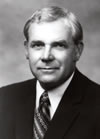In Memory of Norbert T. Tiemann

Norbert T. Tiemann, Former Federal Highway Administrator, passed away on June 19, 2012, at his home in Dallas at the age of 87. Mr. Tiemann, known as "Nobby" to his friends, served almost 4 years as Administrator during a period of transition for the FHWA. He took office on June 1, 1973, while Congress was completing work on the Federal-Aid Highway Act of 1973. With support from Secretary of Transportation Claude S. Brinegar, the 1973 Act gave State and local officials the option to withdraw controversial segments of the Interstate System for funds for alternative highway or transit options. It also gave officials in urbanized areas the option of substituting transit projects for Federal-aid urban system highway projects. Mr. Tiemann, therefore, took office as FHWA was moving away from its traditional highway orientation to an intermodal perspective. This shift in focus accelerated in October 1973 when the oil producing countries of the Middle East withheld shipments of oil to the United States in protest of its policies on Israel. In response, Mr. Tiemann was a national leader in promoting the use of high occupancy vehicles (HOV) and exclusive HOV lanes, enforcement of the new 55 MPH speed limit, the use of transit to reduce driving, auto restrictions in central business districts, and other measures to save energy. Mr. Tiemann was also an early supporter of increased flexibility in the use of highway funds for transit purposes.
Born in Minden, Nebraska, Mr. Tiemann married Lorna Bornholdt of Wausa (population about 750 at the time) in the northeast corner of the State. They had four children, Norbert, Jr., Mary, Lorna, and Amy. When his father-in-law died in 1954, he took over the family-owned bank and, in 1965, became president of the Nebraska Bankers Association. He also served three terms as Mayor of Wausa.
In 1966, Mr. Tiemann, a Republican, won election as Governor of Nebraska with 62 percent of the popular vote, giving him the top State post at a time of fiscal danger that he intended to confront. He adopted an activist role in working with the State legislature to create a tax base that provided the revenue the State needed to function. He also secured approval to enter into bonded indebtedness to pay for road improvements, with the debt backed by motor vehicle license fees and fuel taxes. During his 4-year term, Nebraska undertook the first broad reorganization of the Department of Roads: issued the first bonds for highway construction, established a 20-year plan for expressway construction, initiated the first mandatory driver examinations and motor-vehicle inspection programs, and closed the Omaha Gap on I-80.
Governor Tiemann lost his 1970 reelection bid to businessman James J. Exon. At the time of his nomination to be Federal Highway Administrator, Mr. Tiemann was serving as Vice President for Corporate Finance of First Mid-American, Inc., an investment bank in Lincoln. He also served as president of the Coalition for Rural Development (1971-1973).
When Governor Tiemann took office in June 1973, FHWA had been without an Administrator since the retirement of former Administrator Frank Turner in June 1972. Turner, who had joined the Agency in 1929 (then the U.S. Bureau of Public Roads) and was the only employee to become Administrator, represented the traditional highway approach to transportation, including a preference for highway-oriented transit such as buses. Mr. Tiemann embraced the new philosophy of balanced transportation, with each mode doing what it did best, that the Federal-Aid Highway Act of 1973 reflected. He made his perspective clear in his first speech, on June 18, 1973, to the Western Association of State Highway Officials (WASHO). He said, "we have arrived at a point where we must reduce dependence on private cars in urban areas—particularly during the rush hours—and convince commuters to either form carpools or use public mass transit facilities." Highway officials could no longer think of transportation modes as "independent entities, each with its own constituency and indifferent to the problems and the needs of the others." He explained:
The point is, we must now think in terms of overall TRANSPORTATION planning, and the role of each mode in that plan. The modes cannot be competitive in our highly complex society of today—and tomorrow—instead, they must be complementary.
His tenure was consistent with these initial thoughts. Mr. Tiemann's many accomplishments included administering the largest highway funding program to date; helping to resolve disputes over controversial Interstate segments such as the location of I-95 in Florida and the Crosstown Expressway in Chicago; establishing procedures for the Interstate withdrawal and substitution program; close coordination with the Urban Mass Transportation Administration; advocacy of FHWA's international outreach, including a tour of the transportation facilities in the Soviet Union in 1975; promoting equal employment opportunity for women in the highway construction crafts; and launching a training program in the highway field for Native Americans.
In October 1975, he changed the titles of FHWA's "Division Engineers" to "Division Administrators," noting that the change reflected the evolution of the FHWA from its early engineering function to a broader responsibility for highway management. "We cannot stand still," he said, "we must always be progressive and move forward."
Following the victory of Governor Jimmy Carter in the 1976 presidential election, Mr. Tiemann's service as Administrator came to an end. He left office in January 1977. During his 4 years as Federal Highway Administrator, "Nobby" Tiemann proved to be a transitional figure as FHWA moved from a highway-only agency to an agency that recognized the importance of highways in a multimodal transportation network, especially in the Nation's cities. He instilled in the Agency the idea that FHWA's mission went beyond highways, even beyond transportation to an integral role in the economic, environmental, and social well-being of the Nation.

